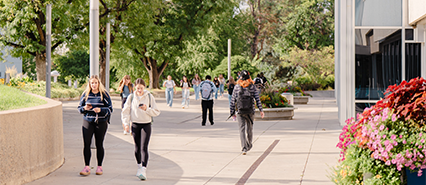Policy for Electronic Reserve Access to Published Copyrighted Materials
The University Library Circulation Department bases its electronic reserve policy on the fair use provisions of the United States Copyright Act of 1976, Section 107, which permit making multiple copies for classroom use, and is one of six examples of uses which do not require the permission of the copyright owner, nor the payment of a royalty if the circumstances of use are fair as assessed by the four factors listed in section 107 of the Copyright Act. The text of this section follows:
“Notwithstanding the provisions of sections 106 and 106A, the fair use of a copyrighted work, including such use by reproduction in copies or phonograph records or by any other means specified in that section, for purposes such as criticism, comment, news reporting, teaching (including multiple copies for classroom use), scholarship or research, is not an infringement of copyright."
In determining whether the use made of a work in any particular case is a fair use the factors to be considered shall include the following:
- The purpose and character of the use including whether such use is of a commercial nature or is for nonprofit educational purposes
- the nature of the copyrighted work;
- the amount and sustainability of the portion used in relation to the copyrighted work as a whole; and
- the effect of the use upon the potential market for or value of the copyrighted work.”
An item for reserve must conform to the above fair use factors based on an analysis using the following widely used interpretations:
- the material is to be used for nonprofit educational use,
- is a published and copyrighted work
- uses an appropriate amount, not including the “heart of the work,”
- is lawfully acquired and cannot replace the sale of a copyrighted work,
The collections of the Colorado State University–Pueblo Library are purchased for the nonprofit educational use of our students and faculty, with the understanding that there will be multiple uses of a limited number of copies. Libraries frequently pay premium institutional subscription prices for journals, expressly for the privilege of supporting multiple academic users. The sole purpose of Electronic Reserves will be to facilitate the making of multiple copies for classroom use by students.
The University Library will adhere to the following procedures in order to insure that items placed on reserve conform to the spirit and letter of the 1976 Copyright Law, and the fair use provisions therein:
- Materials will be placed on Electronic Reserves solely at the initiative of Colorado State University Pueblo faculty for the non-commercial, educational use of their students.
- Materials not owned by the University Library will be purchased whenever possible; if purchase is not possible, a licensing fee will be paid to the publisher.
- No more than one article per journal issue per course may be scanned for placement on Electronic Reserves.
- No more than 25% of an entire book may be scanned for placement on Electronic Reserves.
- There will be no charge for students to access Electronic Reserves.
- A copyright notice will appear on screen and must be acknowledged before the student is permitted to access materials on Electronic Reserves.
- Materials on Electronic Reserves will be accessible only by faculty name or course number.
- Students may access materials on Electronic Reserves only by using a course password.
- Electronic documents will be deleted from the E-reserves system when they are no longer used for course instruction.
- At the end of each semester, Electronic Reserve materials will be archived
- The University Library will adhere to the principles of Fair Use when placing materials on Electronic Reserves.
The electronic copying and scanning of copyright-protected works for library reserve service are unsettled areas of the law which may be addressed by the courts or in future revisions of the copyright law. CSU Pueblo Library will continually monitor legal developments which may affect the fair use analysis of electronic reserve services to ensure that library services are in compliance with the letter and spirit of the United States Copyright Law.
The University Library reserves the right to refuse any material submitted that does not comply with copyright guidelines. However, users of reserve materials assume all risk for purposes of copyright.
Approved 8/1/2014 SLH/RG


